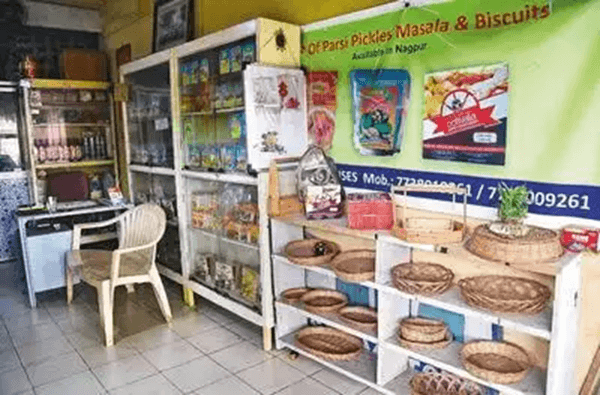If travelling on Ram Jhula towards Mayo Hospital Square, from the passenger side of the car you might be able to catch a glimpse of a small shop below called Banu Enterprises in Shanichara Market, right after the railway tracks below end.
The unassuming facade of this Parsi family-owned shop is actually hiding 100 years old legacy which tells the tale of this enterprising community, Nagpur’s glory days, dwindling fortunes and a late pushback for resurgence.
Article by Abhishek Choudhari | TNN
It’s the only shop in Nagpur where you would find exclusive Parsi food items and condiments, for which otherwise one would have to venture to Mumbai or Gujarat.
In a way, Banu Enterprises’s story is a microcosm view of the Parsi community in Nagpur.
A story of Parsi entrepreneurial spirit, of resilience during downturn and adapting to new challenges all the time.
Banu Enterprises’s journey started 100 summers ago, when a Parsi gentleman called Naoroji Hormusji Battiwala started trading in soap from the shop’s original location at Hansapuri (right next to Mominpura). At that time, the shop operated under the banner of N Hormusji and Co.
Neville Cassad, Naoroji’s maternal grandson, said, “When the shop opened in 1923, Tata group’s Empress Mills was at its peak and they required soaps in bulk for their employees, which Naoroji and his wife Freny, who hailed from Navsari (Gujarat), supplied.”
In 1940s, the small shop from which the trading business was conducted, managed to secure sole distributorship for Imperial Chemicals (India). Cassad said, “Officials from Europe visited Nagpur to complete the formalities. We still have photos of them with Naoroji.”
In 1950s, booming trade meant the shop needed to be relocated. “Naoroji rented a shop in the then newly built Dhannaram building, the place where it still exists,” said Cassad.
Byramji Town, a place which is synonymous with the Parsi community even today, became the location for Naoroji’s new soap manufacturing factory started in 1966. Cassad said, “Banu Industries, named after Naoroji’s mother, was the manufacturing unit and it shut down two decades later. At that spot now is a residential complex — Jaidev apartment — right next to Gondwana Square.”
Naoroji passed away three years after the factory started and the next two decades also witnessed a systemic collapse of textile mills almost everywhere in central India and around.
With this, the intertwined business fortune of what Naoroji had started in 1923, too got impacted. Cassad said, “My maternal uncle Aspi managed it till 1980 or so, following which my mother Zarine Cassad took over.”
The Cassads — Jamshed and Zarine — gave the business a push by diversifying into food manufacturing. “From ketchup to mango juice, we had a variety of items. I too joined in the early 80s while completing by bachelors degree on the side,” he said.
Fortunes again rose and fell by the mid-90s, with Naoroji’s maternal grandchildren ultimately diversifying into other fields.
The shop at Shanichara Market, now renamed Banu Enterprises, has witnessed the zenith of success and tough times, and still stands testament to the Parsi quality of resilience, hard work and very much connected to its roots.
Cassad said, “We now sell ready-to-eat or ready-to-cook items which are staples of Parsi kitchen.
Pickles of prawns, fish eggs, lemon etc, to cookies to masalas which are unique to Parsi households, now find a place in our shelves.”
But more than the 500-odd Parsi community members, it’s others who throng to Banu Enterprises for a taste of Parsi cuisine and food items. These food items tug at childhood memory strings for Parsis, while opening up new vistas of culinary experience for other communities.

